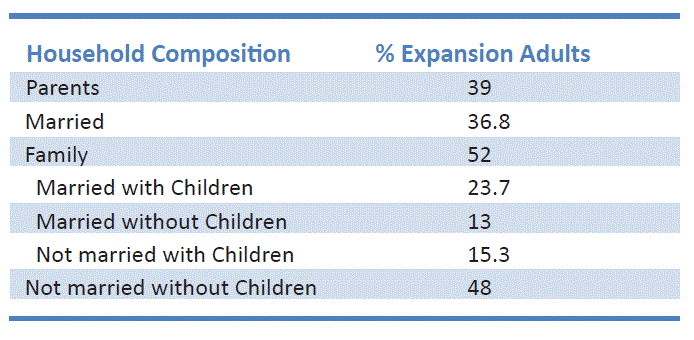
While the vast majority of low-income families with children have at least one full-time worker, most do not qualify, or cannot afford, employer or individual market health insurance plans. Public health coverage programs can equally be out of reach. In most states, Medicaid and CHIP provide coverage to children and pregnant women, but largely exclude parents. However, an extensive body of research shows that when these programs provide coverage to both children and their parents, the entire family benefits.
Download the printer-friendly version of the report here:
A Two-Generation Strategy: Healthy Parents and Healthy Kids
Obviously, covering low-income parents increases their own insurance coverage and access to care. But the benefits do not stop at mom and dad. When parents have access to Medicaid, their Medicaid and CHIP eligible children are much more likely to get enrolled in coverage. Further, parental Medicaid coverage leads to improved use of health care for children, such as preventive care.
Parents living in states that have expanded Medicaid have seen nearly a 33% drop in the rate of parents living without health insurance. States that have not expanded Medicaid have seen no significant change in the rate of uninsured parents.
Medicaid Expansion: Parents and Children Benefit
Partly in reaction to this research, the Affordable Care Act (ACA) required states to move from Medicaid’s old categorical and individual centric approach to a more family centric program that would provide coverage to low-income children and parents alike. The 2012 United States Supreme Court decision that upheld the overall constitutionality of ACA, changed this section of law. Instead of mandating that states provide adults Medicaid coverage, the Court gave states the option to provide Medicaid coverage.
Over half of the states, including the District of Columbia, have expanded Medicaid for parents and other low-income adults. Unfortunately many states, including Utah, have not yet decided to expand Medicaid coverage to adults—and as a result, retained their individual centric Medicaid programs and higher rates of uninsured adults.
How Expansion Would Help Utah Families
Studies have repeatedly shown that health care coverage has a myriad of positive effects for families. Whether that coverage be private employer plans or a public Medicaid program, families’ financial security, ability to work, and the health of parents and children improve when adults have health insurance.
People with Medicaid coverage fare much better than uninsured on measures of access to care, utilization, and unmet health needs. Children enrolled in Medicaid, for example, are more likely to receive well-child care and are significantly less likely to have unmet or delayed needs for medical care, dental care, and prescription drugs due to cost.
Research suggests that Medicaid coverage has similar benefits for adults. Mothers covered by Medicaid are much more likely than low-income uninsured mothers to have a usual source of care, a doctor visit, a dental visit, and to receive cancer screening services. Adults covered by Medicaid are more likely than uninsured adults to report health care visits overall and visits for specific types of services. They are also more likely to report timely care and less likely to delay, or go without, needed medical care because of cost.
Further, out-of-pocket spending would decrease dramatically for low-income uninsured adults—almost four-fold on average, if they had access to Medicaid.
Recently, the Oregon Health Insurance Experiment has provided real life evidence about the positive impact of Medicaid coverage for low-income uninsured adults. Oregon had a lottery for a limited number of a slots in their Medicaid program for adults. This provided researchers the opportunity to look at the differences between adults who received Medicaid coverage and those who remained uninsured. Results from the Oregon experiment found that:
• 70% of enrollees were more likely to have a regular place of care
• 55% of enrollees were more likely to have a regular doctor
• Catastrophic out-of-pocket spending (health costs that exceed 30% of income) was nearly eliminated
• Any type of medical debt was reduced by more than 20%
Expanding coverage could have a direct impact on the health of children as well. Low-income adults are generally sicker than higher income adults. They suffer from increased likelihood of depression and other health issues that can lead to greater risk of their kids experiencing toxic stress. Medicaid expansion may help reduce this risk.
Unfortunately, low income adults in Utah are not experiencing these benefits of health coverage because the state has not yet chosen to expand Medicaid.
The data shows this is a significant problem in Utah where the story of uninsured adults is starkly different than the story of uninsured kids. Thirty-nine percent of adults below 138% of poverty and 43% of adults below poverty are uninsured in Utah. This compares to an uninsured rate of only 19% for adults with incomes above 138% of poverty.
The experience that states have had with children shows that providing access to Medicaid can dramatically reduce uninsured rates. The uninsured rate for children in Utah in households with incomes below 138% is only 18%.
The impact of Medicaid expansion does not stop with the adults who would gain coverage. Although much of the advocacy efforts surrounding Medicaid Expansion have focused only on the individual adults who would gain coverage, the reality is that over half of the expansion population is in a family (two or more related individuals), and nearly 40% are parents of children under the age 18. Providing health coverage to these adults in families will have a positive impact on everyone in that family.
Another misconception about the expansion population is their employment status. The fact is that 87% of families who would benefit from expansion include at least one working parent and 61.5% have at least one parent working full-time.
Unfortunately these families either do not have an offer of employer sponsored coverage, or cannot afford the employer sponsored insurance that is available. Only 29% of adults below 138% of poverty are enrolled in an employer sponsored health insurance plan.
Conclusion
Expanding Medicaid in Utah will strengthen Utah families. The improved health and financial security from providing health coverage to parents will greatly improve the opportunity to stop the cycle of intergenerational poverty.
Voices for Utah Children is proud to be a part of the Aspen Institute Ascend Network. The goal of the Aspen Institute Ascend Network is to mobilize empowered two-generation organizations and leaders to influence policy and practice changes that increase economic security, educational success, social capital, and health and well-being for children, parents, and their families. Learn more at http:/ /ascend.aspeninstitute.org/network








